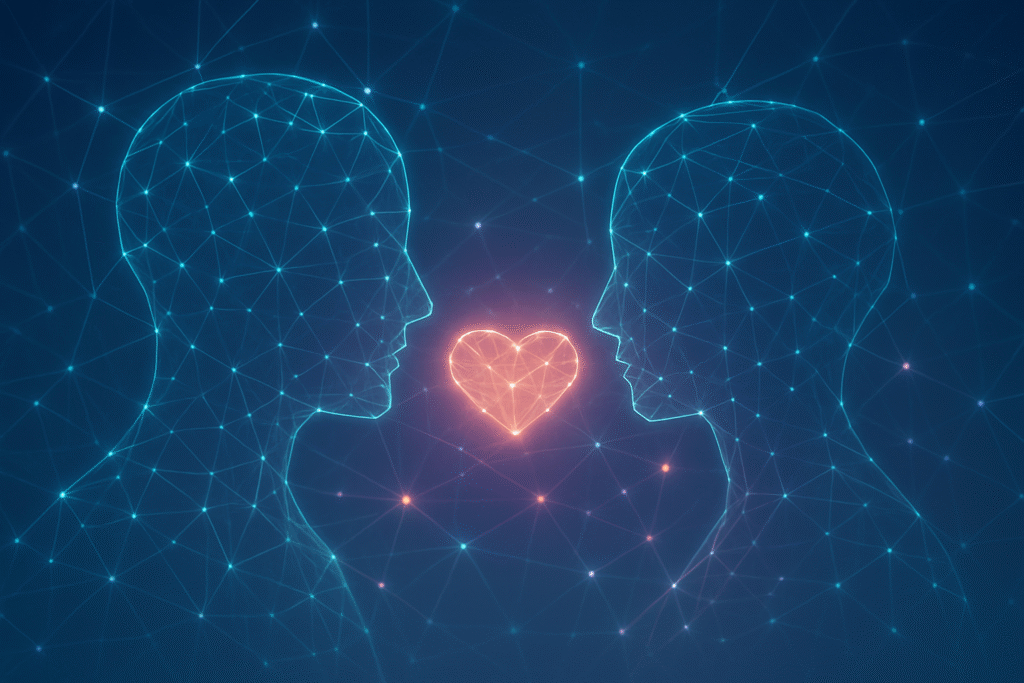
Artificial Intelligence is profoundly transforming the landscape of dating applications, moving beyond the era of endless swiping and superficial connections to usher in a new paradigm of enhanced matchmaking and deeply personalized user experiences. This technological evolution, driven by sophisticated machine learning algorithms, promises to make the quest for connection more efficient, meaningful, and secure. As The New York Times recently highlighted, AI tools are fundamentally altering how users interact with these platforms and find potential partners, marking a significant shift in the digital dating sphere.
The immediate significance of AI's integration is multi-faceted, aiming to combat the prevalent "swipe fatigue" and foster more genuine interactions. By analyzing intricate behavioral patterns, preferences, and communication styles, AI is designed to present users with more compatible matches, thereby increasing engagement and retention. While offering the allure of streamlined romance and personalized guidance, this rapid advancement also ignites critical discussions around data privacy, algorithmic bias, and the very authenticity of human connection in an increasingly AI-mediated world.
The Algorithmic Heart: How AI is Redefining Matchmaking
The technical underpinnings of AI in dating apps represent a significant leap from previous generations of online matchmaking. Historically, dating platforms relied on basic demographic filters, self-reported interests, and simple rule-based systems. Today, AI-powered systems delve into implicit and explicit user behavior, employing advanced algorithms to predict compatibility with unprecedented accuracy. This shift moves towards "conscious matching," where algorithms continuously learn and adapt from user interactions, including swiping patterns, messaging habits, and time spent viewing profiles.
Specific AI advancements include the widespread adoption of Collaborative Filtering, which identifies patterns and recommends matches based on similarities with other users, and the application of Neural Networks and Deep Learning to discern complex patterns in vast datasets, even allowing users to search for partners based on visual cues from celebrity photos. Some platforms, like Hinge, are known for utilizing variations of the Gale-Shapley Algorithm, which seeks mutually satisfying matches. Natural Language Processing (NLP) algorithms are now deployed to analyze the sentiment, tone, and personality conveyed in bios and messages, enabling features like AI-suggested icebreakers and personalized conversation starters. Furthermore, Computer Vision and Deep Learning models analyze profile pictures to understand visual preferences, optimize photo selection (e.g., Tinder's "Smart Photos"), and, crucially, verify image authenticity to combat fake profiles and enhance safety.
These sophisticated AI techniques differ vastly from their predecessors by offering dynamic, continuous learning systems that adapt to evolving user preferences. Initial reactions from the AI research community and industry experts are mixed. While there's optimism about improved match quality, enhanced user experience, and increased safety features (Hinge's "Standouts" feature, for example, reportedly led to 66% more matches), significant concerns persist. Major ethical debates revolve around algorithmic bias (where AI can perpetuate societal prejudices), privacy and data consent (due to the highly intimate nature of collected data), and the erosion of authenticity, as AI-generated content blurs the lines of genuine human interaction.
Corporate Crossroads: AI's Impact on Dating Industry Giants and Innovators
The integration of AI is fundamentally reshaping the competitive landscape of the dating app industry, creating both immense opportunities for innovation and significant strategic challenges for established tech giants and agile startups alike. Companies that effectively leverage AI stand to gain substantial market positioning and strategic advantages.
Major players like Match Group (NASDAQ: MTCH), which owns a portfolio including Tinder, Hinge, OkCupid, and Plenty of Fish, are heavily investing in AI to maintain their market dominance. Their strategy involves embedding AI across their platforms to refine matchmaking algorithms, enhance user profiles, and boost engagement, ultimately leading to increased match rates and higher revenue per user. Similarly, Bumble (NASDAQ: BMBL) is committed to integrating AI for safer and more efficient user experiences, including AI-powered verification tools and improved matchmaking. These tech giants benefit from vast user bases and substantial resources, allowing them to acquire promising AI startups and integrate cutting-edge technology.
Pure-play AI companies and specialized AI solution providers are also significant beneficiaries. Startups like Rizz, Wingman, LoveGenius, Maia, and ROAST, which develop AI assistants for crafting engaging messages and optimizing profiles, are finding a growing market. These companies generate revenue through licensing their AI models, offering API access, or providing end-to-end AI development services. Cloud computing providers such as Amazon (NASDAQ: AMZN), Google (NASDAQ: GOOGL), and Microsoft (NASDAQ: MSFT) also benefit as dating apps host their AI models and data on their scalable cloud platforms.
AI is disrupting existing products and services by rendering traditional, static matchmaking algorithms obsolete. It's revolutionizing profile creation, offering AI-suggested photos and bios, and changing communication dynamics through AI-powered conversation assistance. For startups, AI presents opportunities for disruption by focusing on niche markets or unique matching algorithms (e.g., AIMM, Iris Dating). However, they face intense competition from established players with massive user bases. The ability to offer superior AI performance, enhanced personalization, and robust safety features through AI is becoming the key differentiator in this saturated market.
Beyond the Swipe: AI's Broader Societal and Ethical Implications
The embedding of AI into dating apps signifies a profound shift that extends beyond the tech industry, reflecting broader trends in AI's application across intimate aspects of human life. This development aligns with the pervasive use of personalization and recommendation systems seen in e-commerce and media, as well as the advancements in Natural Language Processing (NLP) powering chatbots and content generation. It underscores AI's growing role in automating complex human interactions, contributing to what some term the "digisexual revolution."
The impacts are wide-ranging. Positively, AI promises enhanced matchmaking accuracy, improved user experience through personalized content and communication assistance, and increased safety via sophisticated fraud detection and content moderation. By offering more promising connections and streamlining the process, AI aims to alleviate "dating fatigue." However, significant concerns loom large. The erosion of authenticity is a primary worry, as AI-generated profiles, deepfake photos, and automated conversations blur the line between genuine human interaction and machine-generated content, fostering distrust and emotional manipulation. The potential for AI to hinder the development of real-world social skills through over-reliance on automated assistance is also a concern.
Ethical considerations are paramount. Dating apps collect highly sensitive personal data, raising substantial privacy and data security risks, including misuse, breaches, and unauthorized profiling. The opaque nature of AI algorithms further complicates transparency and user control over their data. A major challenge is algorithmic bias, where AI systems, trained on biased datasets, can perpetuate and amplify societal prejudices, leading to discriminatory matchmaking outcomes. These concerns echo broader AI debates seen in hiring algorithms or facial recognition technology, but are amplified by the emotionally vulnerable domain of dating. The lack of robust regulatory frameworks for AI in this sensitive area means many platforms operate in a legal "gray area," necessitating urgent ethical oversight and transparency.
The Horizon of Love: Future Trends and Challenges in AI-Powered Dating
The future of AI in dating apps promises even more sophisticated and integrated experiences, pushing the boundaries of how technology facilitates human connection. In the near term, we can expect to see further refinement of existing functionalities. AI tools for profile optimization will become more advanced, assisting users not only in selecting optimal photos but also in crafting compelling bios and responses to prompts, as seen with Tinder's AI photo selector and Hinge's coaching tools. Enhanced security and authenticity verification will be a major focus, with AI playing a crucial role in combating fake profiles and scams through improved machine learning for anomaly detection and multi-step identity verification. Conversation assistance will continue to evolve, with generative AI offering real-time witty replies and personalized icebreakers.
Long-term developments envision a more profound transformation. AI is expected to move towards personality-based and deep compatibility matchmaking, analyzing emotional intelligence, psychological traits, and subconscious preferences to predict compatibility based on values and life goals. The emergence of lifelike virtual dating coaches and relationship guidance AI bots could offer personalized advice, feedback, and even anticipate potential relationship issues. The concept of dynamic profile updating, where profiles evolve automatically based on changing user preferences, and predictive interaction tools that optimize engagement, are also on the horizon. A more futuristic, yet increasingly discussed, application involves AI "dating concierges" or "AI-to-AI dating," where personal AI assistants interact on behalf of users, vetting hundreds of options before presenting highly compatible human matches, a vision openly discussed by Bumble's founder, Whitney Wolfe Herd.
However, these advancements are not without significant challenges. Authenticity and trust remain paramount concerns, especially with the rise of deepfake technology, which could make distinguishing real from AI-generated content increasingly difficult. Privacy and data security will continue to be critical, requiring robust compliance with regulations like GDPR and new AI-specific laws. Algorithmic bias must be diligently addressed to ensure fair and inclusive matchmaking outcomes. Experts largely agree that AI will serve as a "wingman" to augment human connection rather than replace it, helping users find more suitable matches and combat dating app burnout. The industry is poised for a shift from quantity to quality, prioritizing deeper compatibility. Nonetheless, increased scrutiny and regulation are inevitable, and society will grapple with evolving social norms around AI in personal relationships.
The Digital Cupid's Bow: A New Era of Connection or Complication?
The AI revolution in dating apps represents a pivotal moment in the history of artificial intelligence, showcasing its capacity to permeate and reshape the most intimate aspects of human experience. From sophisticated matchmaking algorithms that delve into behavioral nuances to personalized user interfaces and AI-powered conversational assistants, the technology is fundamentally altering how individuals seek and cultivate romantic relationships. This is not merely an incremental update but a paradigm shift, moving online dating from a numbers game to a potentially more curated and meaningful journey.
The significance of this development in AI history lies in its demonstration of AI's capability to navigate complex, subjective human emotions and preferences, a domain previously thought to be beyond algorithmic reach. It highlights the rapid advancement of generative AI, predictive analytics, and computer vision, now applied to the deeply personal quest for love. The long-term impact will likely be a double-edged sword: while AI promises greater efficiency, more compatible matches, and enhanced safety, it also introduces profound ethical dilemmas. The blurring lines of authenticity, the potential for emotional manipulation, persistent concerns about data privacy, and the perpetuation of algorithmic bias will demand continuous vigilance and responsible innovation.
In the coming weeks and months, several key areas warrant close observation. Expect to see the wider adoption of generative AI features for profile creation and conversation assistance, further pushing the boundaries of user interaction. Dating apps will likely intensify their focus on AI-powered safety and verification tools to build user trust amidst rising concerns about deception. The evolving landscape will also be shaped by ongoing discussions around ethical AI guidelines and regulations, particularly regarding data transparency and algorithmic fairness. Ultimately, the future of AI in dating will hinge on a delicate balance: leveraging technology to foster genuine human connection while safeguarding against its potential pitfalls.
This content is intended for informational purposes only and represents analysis of current AI developments.
TokenRing AI delivers enterprise-grade solutions for multi-agent AI workflow orchestration, AI-powered development tools, and seamless remote collaboration platforms.
For more information, visit https://www.tokenring.ai/





